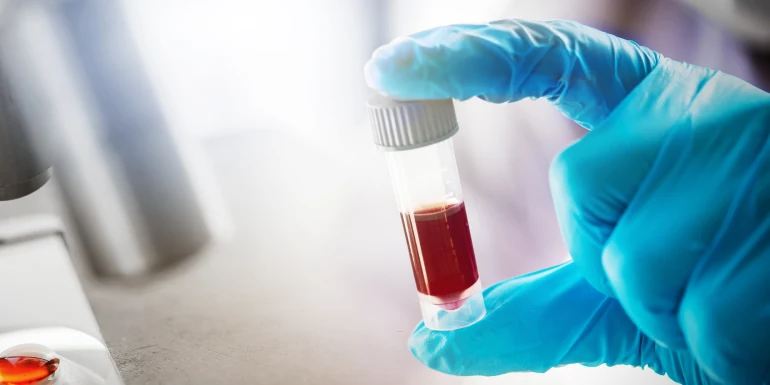
Iron deficiency creeps up on you
Iron deficiency is one of the most common deficiency symptoms. It mainly affects women. What are the effects of iron deficiency? These are the most common symptoms.
Our body needs iron to produce blood and transport oxygen in the blood. Iron is also important for a number of metabolic processes. The body cannot produce iron itself. Instead, it must get iron from food sources. People who eat a balanced and nutrient-rich diet generally do not have iron deficiency.
Over the long term, too little iron can lead to iron-deficiency anaemia. When this occurs, the blood is no longer able to transport sufficient oxygen. Physical and mental performance decline.
Symptoms of iron deficiency
Iron deficiency creeps up on you. The initial symptoms often only occur at a later stage – apart from tiredness. The longer the deficiency lasts, the stronger the symptoms and the greater the impact on our health. There are three phases of iron deficiency:
Phase 1: undetected
If the body gets too little iron, it can at first make up for this deficiency from the iron it has stored in the liver and spleen. It is still capable of producing sufficient red blood cells. During this phase, there are few manifestations of iron deficiency. However, those affected often feel tired and fatigued.
Phase 2: initial outer signs
If the iron deficiency continues, the stores of iron will be depleted at some point. When that happens, the cells will no longer receive sufficient supplies. The body will then seek out the important nutrients it needs to produce red blood cells from their transporters, transferrins. Transferrin saturation in the blood will decrease. Frequent symptoms during this phase include:
- Persistent fatigue
- Brittle hair and hair loss
- Cracks on the corner of the mouth
- Dry skin
- A burning sensation on the tongue
- Difficulty swallowing
- Susceptibility to infections
Phase 3: impending anaemia
Once the iron stores have been depleted, the body will resort to using iron in the blood. This interrupts the production of red blood cells, leading to iron-deficiency anaemia. In such cases, the blood either has too few red blood cells or the haemoglobin content of the red blood cells is reduced. Typical symptoms of this illness include:
- Dizziness
- Headache
- A decline in physical and mental performance
- Irritability
- Disrupted thermal regulation
- Difficulty breathing when under strain, later on even when at rest
- Heart palpitations
- Ringing in the ears
- Pale skin
However, anaemia can also be the result of a deficiency of vitamin B12 or internal bleeding. A vitamin B12 deficiency can also cause loss of appetite, digestive problems and weight loss. Anaemia caused by internal bleeding can result in black stool or blood in the stool or urine.
Most frequent signs of iron deficiency in children
- Fatigue
- Weakness
- Pale skin
- Irritability
- Listlessness
- Lack of concentration
When should you see a doctor?
If you are constantly tired, you should seek out the underlying causes if you have other symptoms. This is especially true for children because an iron deficiency can cause growth disorders, among other things. Do not take iron supplements on your own initiative without a diagnosis. People who experience constant tiredness may be suffering from another illness. Schedule an appointment to see your general practitioner or paediatrician for a precise evaluation.
Our health consultation advisors would be happy to provide you with general nutrition tips as well as information about nutrient deficiencies.
Iron deficiency affects women more frequently
An iron deficiency manifests itself in the same way among women and men – but women tend to have it more often than men. This is because of blood loss during menstruation. Vegetarians and vegans often have an iron deficiency as well because the human intestines have a more difficult time absorbing iron from plant sources. The most frequent causes of iron deficiency are:
- Too little or disrupted iron absorption: for example, when dieting, in the case of vegetarian or vegan diets, those suffering from coeliac disease
- Increased iron needs: pregnancy, nursing, competitive sports, children and young people when they are growing
- Loss of iron: strong regular bleeding, loss of blood from operations or blood donations, chronic inflammatory bowel disease
Only a doctor can tell you if and why you have iron deficiency. A blood test will quickly provide you with clarity about your iron levels.

The expert in this field provided the editorial team with advice and input for this article. Eliane Wyss (medical assistant and nutrition coach) works in the Helsana health consultation service. She supports customers on questions to do with nutrition and other health topics.



Newsletter
Find out more about current health issues every month and get all the information you need about our attractive offers from all Helsana Group companies * delivered by e-mail to read whenever it suits you. Our newsletter is free of charge and you can sign up here:
We did not receive your information. Please try again later.
* The Helsana Group comprises Helsana Insurance Company Ltd, Helsana Supplementary Insurances Ltd and Helsana Accidents Ltd.